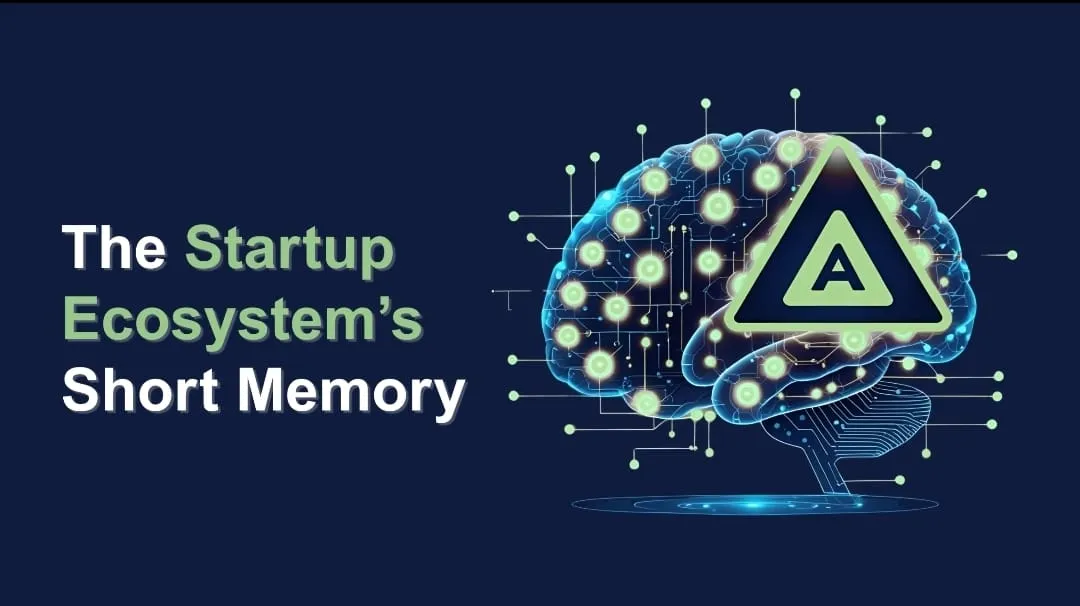The Startup Ecosystem’s Short Memory: A Cautionary Tale

The startup world runs on ambition. And crashes on amnesia.
Take Builder.ai, the AI-powered app development platform once backed by Microsoft and Qatar’s sovereign fund. For a while, it was billed as the next big thing in no-code software — raising over $500 million and soaring to a $1.3 billion valuation. Then came May 2025. Bankruptcy. Revenue was $55 million against a forecast of $220 million. Lenders seized $37 million. The “magic” gave way to math.
But this isn’t an outlier. It’s a recurring pattern. From Theranos and WeWork to FTX, Housing.com, and eFishery, we’ve seen the same red flags before. We just keep forgetting them.
The Mistakes We Keep Making
1. Founders chasing spotlight over substance
At FTX, Sam Bankman-Fried wasn’t just building a company — he was crafting a persona. It cost billions. Housing.com burned through capital and credibility with chaotic pivots and founder theatrics. These weren’t missteps. They were warnings. Loud ones.
2. Speed above all else
Builder.ai’s investors bet big on momentum. But scale without real traction just fast-forwards failure. Think back to WeWork — a $47 billion illusion driven more by energy than economics. Growth for growth’s sake rarely ends well.
3. Governance on paper, not in practice
Theranos had a star-studded board. Not one of them asked the hard questions. eFishery reportedly overstated revenue by up to 5x — and no one caught it internally. Weak governance isn’t a back-office issue. It’s often where the cracks start.
4. Diligence skipped, instincts ignored
In the 2021 funding rush, PharmEasy hit a $5.6 billion valuation. That didn’t last. Valuations dropped by nearly 90 percent as basic flaws came to light. Somewhere along the way, caution gave way to FOMO.
5. Media’s role in reinforcing the illusion
Builder.ai’s “AI-powered” magic? In many cases, it was manual work dressed up as automation. But the coverage rarely questioned it. Just as WeWork’s “community-adjusted EBITDA” went unchallenged, the tech press sometimes amplifies narratives without scrutiny. And that fuels the cycle.
Why It Keeps Happening
These breakdowns don’t live in silos. They feed into one another. Overconfident founders attract fast capital. Loose oversight lets issues fester. The next wave of investors skips the fine print. Meanwhile, media spins failure into future comeback.
When things collapse, we pivot to the next hopeful pitch. Often, it’s the same names on the decks — founders returning, investors reinvesting. And the wheel keeps turning.
The Next Bubble Might Already Be Here
In 2024, billions poured into AI startups. Everyone claimed to be “AI-first” — from thin wrappers on open-source models to hastily built ChatGPT clones. Builder.ai leaned heavily into the narrative. It didn’t help.
AI can be transformative. But it won’t save you from a bad business model. Or sloppy execution. Saying “AI will fix it” is not a strategy. It’s a delay tactic.
So, What Needs to Change?
The startup ecosystem doesn’t need more money. It needs a reset on discipline.
Founders: Build quietly. Build well. Not for headlines, but for durability.
VCs: Back teams that can survive the winter, not just sprint through summer.
Boards: Oversight isn’t symbolic — it’s functional.
Investors: Charisma is easy to fake. Numbers aren’t.
Media: Curiosity beats cheerleading. Look harder.
More Hype Isn’t Worth Another Implosion
We don’t need another redemption arc. We need fewer preventable collapses.
Let’s try something harder but more valuable: learning from what didn’t work. Pausing before the next pitch. Asking better questions. Valuing discipline as much as disruption.
We’ve watched this movie before. Maybe it’s time to change the ending.





.webp)

